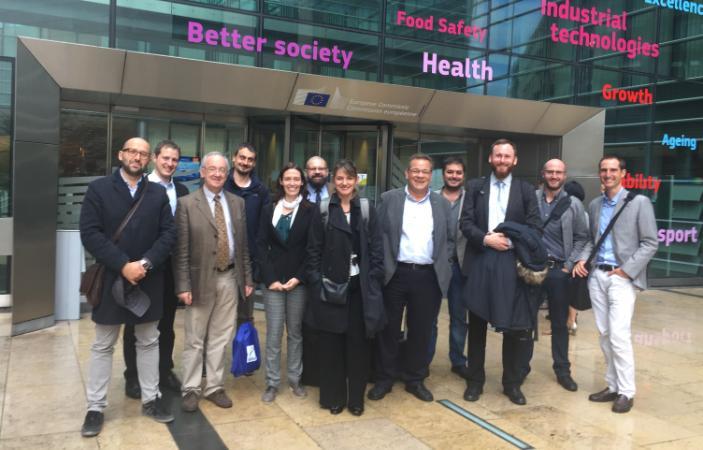Final Meeting with the European Commission, Brussels, Belgium: Monday 3rd October 2016
Key Members of the SIRBATT Consortium attended a Final Meeting with the European Commission on Monday 3rd October 2016, including Professor Laurence Hardwick (Co-ordinator) and Dr Gilberto Teobaldi from the University of Liverpool. They presented the outcomes of the project to EC representatives and external monitoring experts Mikael Cugnet (CEA, France) and Irina Gocheva, (Austrian Institute of Technology, Austria).

The project aimed to achieve a radical improvement in the fundamental understanding of the structure and reactions occurring at the electrode/electrolyte interfaces of lithium-ion batteries, covering both experimental and theoretical aspects. This understanding is fundamental in developing strategies to boost the life-cycle and safety of lithium batteries. The EC considered that new insights had been reached through SIRBATT bringing the “next stage of battery development to innovative engineering, improved materials for the next generation of energy storage devices in addition to improving safety”. They further considered that SIRBATT, had through the work led by Dr Gilberto Teobaldi, “demonstrated novel computational architectures capable of addressing the problems of the electrode/electrolyte interface for numerous investigation models for the anodes and cathodes utilised in contemporary battery technology”.
The project also achieved innovative concepts concerning adoption of non-conventional lithium salts in the electrolyte formulation for next-generation electrolytes, obtained by the facile reaction route that showed stability toward various electrode materials. Their exploration, the EC considered, is already an “achievement beyond the state-of-the-art”.
Studies on cycling stability in conventional, polymer and ionic liquid based electrolytes, which took place within the SIRBATT project, defined crucial factors governing the shelf life and cyclability of contemporary batteries. One of the main technical achievements of SIRBATT was the successfully built in situ setup for the investigation of Li metal-electrolyte interfaces, specifically dendrite growth, the ultimate safety concern of Li-metal anodes.
A unique goal of SIRBATT was to develop microsensors able to monitor simultaneously the temperature and pressure of lithium cells, maintaining optimum operating conditions thereby allowing longer lifetimes. Overall the EC considered that the project had “manufactured, tested and demonstrated the use of microsensors to a convincing level” and that the project had been “successfully accomplished”.
SIRBATT’s project management was highly praised by the EC who noted there was a strong lead from the co-ordinator. The large number of partners involved in the project made this task difficult, but the project management succeeded in showing a strong ability in managing the consortium, overseeing the scientific validation of results, directing the project development and in building strong relationships between partners.